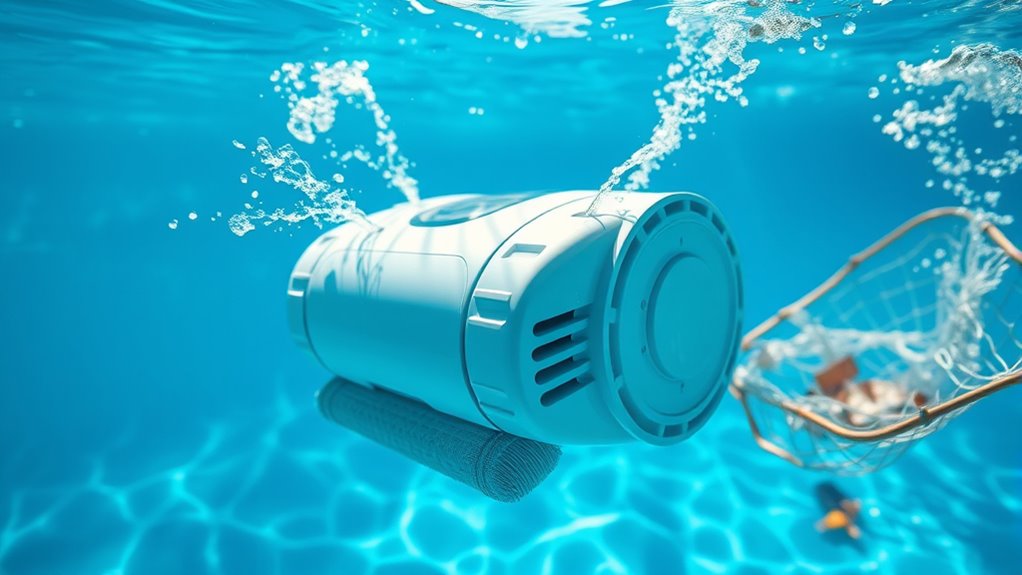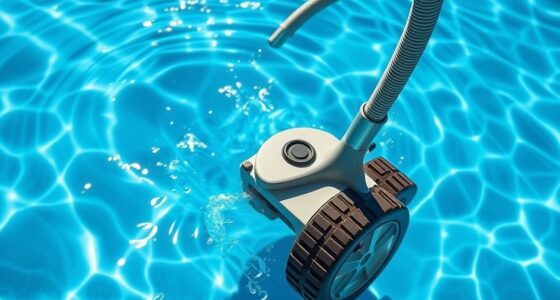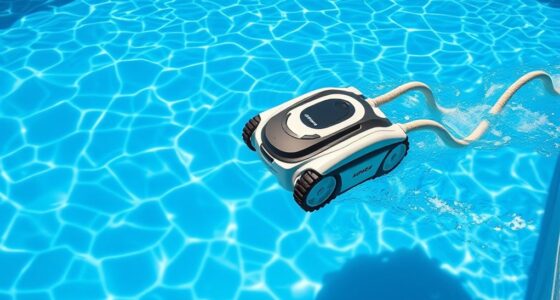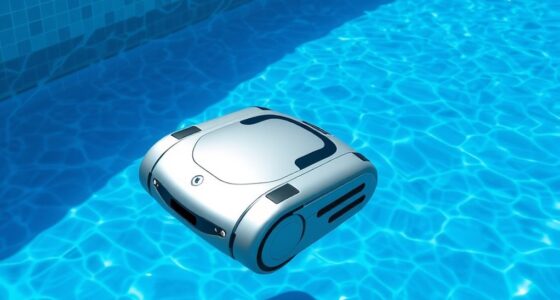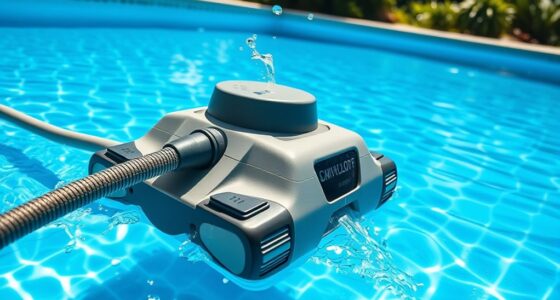Many people believe that automatic pool cleaners are a set-it-and-forget-it fix that keeps pools perfectly clean without any ongoing effort. In reality, these devices require regular maintenance, such as cleaning filters and checking brushes, to work effectively. They’re great helpers but don’t replace routine tasks like skimming or chemical balancing. Understanding their limitations and proper care can help you get the most from your cleaner—discover more tips for ideal use as you explore further.
Key Takeaways
- Robotic pool cleaners assist but do not replace regular pool maintenance like skimming and chemical balancing.
- They require ongoing upkeep, such as cleaning filters and inspecting brushes, to perform effectively.
- Not all models suit every pool size or shape; selecting the right one is essential for optimal cleaning.
- These devices have limited lifespans and need proper care to prevent breakdowns and extend their usability.
- Understanding how robotic cleaners work helps troubleshoot issues and prevents unrealistic expectations of flawless operation.

Many people believe that automatic pool cleaners are a one-size-fits-all solution for keeping pools spotless, but that’s a common misconception. While these devices can substantially reduce your pool maintenance time, they aren’t magic bullets. Instead, their effectiveness depends on understanding how robotic technology works and recognizing that some maintenance myths persist. Robotic pool cleaners are powered by advanced technology that allows them to navigate and scrub your pool with minimal input. They use sensors, brushes, and programmable movement patterns to target dirt and debris. However, many assume that once you buy one, your pool will stay pristine effortlessly. That’s not true. Robotic technology is impressive, but it doesn’t replace regular maintenance routines, like skimming, chemical balancing, or checking filters. These devices are tools to assist, not substitutes for thorough pool care.
Another common myth is that automatic cleaners are completely maintenance-free. Some folks think they can set it and forget it, but that’s far from reality. These machines do require regular upkeep—cleaning out filters, checking brushes, and ensuring the robot’s sensors aren’t obstructed. Neglecting these tasks can diminish performance over time. Additionally, many believe that robotic cleaners are suitable for all pool types and sizes. While they can work well in many settings, some models are better suited for specific shapes or depths. For example, pools with complex layouts or very deep areas might need specialized equipment or manual intervention. Assuming one model fits all scenarios can lead to frustration and poor results. Proper maintenance and understanding of home decor concepts like wall organization and material durability can prolong their lifespan and optimize performance. It’s also a maintenance myth that robotic cleaners will last forever without issues. Like any device, they have a lifespan and may need repairs or replacement parts eventually. Proper care—such as rinsing the robot after use, storing it properly, and following manufacturer guidelines—extends its life. Recognizing the importance of regular inspections and timely repairs can prevent unexpected breakdowns. It’s also helpful to understand the technology behind robotic pool cleaners, which highlights their strengths and limitations. But expecting them to work flawlessly year after year isn’t realistic. Many people overlook the importance of reading the user manual thoroughly, thinking that robotic technology is so advanced that no troubleshooting will be necessary. However, understanding how your specific model operates helps you troubleshoot common problems quickly and keep it running smoothly. Being aware of potential common malfunctions can save you time and money, avoiding unnecessary replacements or repairs.
Frequently Asked Questions
Do Automatic Pool Cleaners Work Effectively on All Pool Surfaces?
Automatic pool cleaners can work effectively on most pool surfaces, but their performance depends on pool surface compatibility and cleaner material effectiveness. You should choose a cleaner designed for your specific pool surface, whether vinyl, tile, or gunite, as some cleaners handle certain surfaces better. Properly matching the cleaner to your pool ensures ideal cleaning results, preventing damage and ensuring thorough debris removal.
Are Automatic Pool Cleaners Suitable for Large or Complex Pools?
Automatic pool cleaners can be suitable for large pools and complex pools if you choose the right type. Robotic cleaners with advanced navigation work well on intricate layouts, while suction or pressure-side cleaners can handle bigger areas efficiently. You need to guarantee the cleaner’s capacity matches your pool size and complexity. With proper selection, automatic cleaners make maintaining large or complex pools easier and more effective.
How Often Should I Manually Clean My Automatic Pool Cleaner?
You should manually clean your automatic pool cleaner regularly to guarantee ideal performance. The cleaning frequency depends on your pool’s usage and environment, but generally, check and clean the filter and brushes weekly. Manual maintenance involves removing debris and rinsing components to prevent clogs. By staying on top of this routine, you’ll keep your cleaner working efficiently and extend its lifespan, making pool maintenance easier and more effective.
Can Automatic Pool Cleaners Remove Fine Debris Like Algae or Bacteria?
Think of your automatic pool cleaner as a diligent gardener—it’s great at sweeping up leaves and dirt, but when it comes to algae removal and bacteria filtration, it’s not a magic wand. Fine debris like algae and bacteria often slip through its grasp. For a crystal-clear pool, you’ll need to supplement with chemical treatments and manual cleaning, ensuring your water stays safe and inviting.
Do Automatic Pool Cleaners Consume Significant Electricity or Increase Energy Bills?
You might wonder if automatic pool cleaners substantially impact your energy bills. Typically, their energy consumption is quite low, especially compared to other household appliances. They operate efficiently and don’t run constantly, so the cost implications are minimal. If you choose energy-efficient models, you’ll further reduce energy use, making automatic pool cleaners a cost-effective way to keep your pool clean without dramatically increasing your energy bills.
Conclusion
So, next time you hear someone say automatic pool cleaners are lazy and ineffective, just remember how much they actually do—without a complaint. It’s ironic, isn’t it? You’ve got a device that works tirelessly, saving you time and effort, yet some still see it as a shortcut. Maybe the real misconception is thinking you’re the only one doing the hard work. Trust the cleaner; it’s the true hero of your pool.
